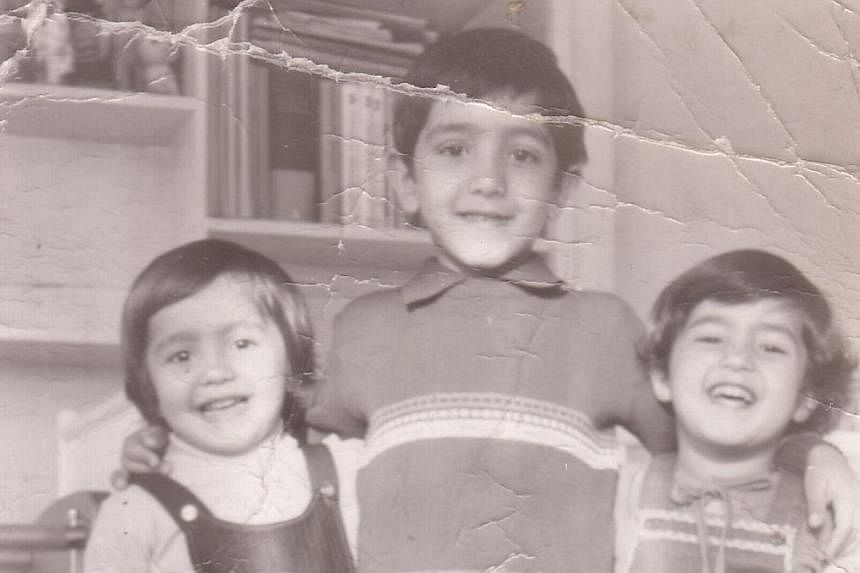Trainee solicitor Natasha Latiff, 27, first became intrigued by Afghanistan after reading an article when she was 12.
It described the great lengths that girls went to to receive an education under the country's hardline Taleban regime, including hiding their textbooks in sewing machines and under Quran covers.
About the same time, in 2000, she came across a video which changed her life.
The footage showed a woman, dressed in a pale blue burqa, executed by a Taleban gunman in front of thousands of spectators in a stadium in Kabul, the capital of Afghanistan.
After viewing the video, Ms Natasha, who is Muslim, became determined to find a way to help those oppressed by the regime.
The shocking video played a role in her later work with refugees, as well as bringing her and her husband, who is a former Afghan refugee, together.
When she was 15, she started sponsoring a girl, a former Afghan refugee who had returned to Kabul after years in exile in Pakistan. She paid US$30 a month for the child's living expenses and the arrangement lasted about five years.
Her determination and boldness can be seen in other ways. While she was in secondary school here, she was disappointed by the school's lack of interest in topics that she was passionate about, which in her words were "the United States' war on terror, Islamic law, the rule of law and women's rights".
So she decided to change schools, applying to 45 schools in England without telling her mother Madam Lailah Latiff, a single parent. She got two scholarship offers and eventually attended King's St Michael's College, a boarding school in Worcestershire, England, where she did her A levels.
At the age of 17, she flew from England to Kabul in secret to meet the child she was sponsoring. She had lied to her mother in Singapore that she was "working with Moroccan refugees in the Czech Republic".
The two weeks Ms Natasha spent in Kabul was the start of a relationship with war-battered Afghanistan which has lasted 10 years.
She says: "At first, you read so much about the place and now you're seeing it in 3-D. Your senses come alive. There's dust in the air, even the stench of the drains. It's the complete opposite of Singapore."
She adds that she sometimes dressed like a boy to be able to walk more freely in the city's markets, hiding her long hair in a traditional turban.
She returned to England where she read law at the University of Warwick. There, she started a society, which later became the non-governmental organisation (NGO) Strategic Advocacy of Human Rights.
For the next 10 years, she visited Afghanistan almost every year for up to three months each time. She moved to Kabul to work full-time as a human-rights adviser for three years, from 2011 to 2014, returning to Singapore last year to complete her bar.
With 2.7 million refugees, Afghanistan has the world's second largest refugee population under United Nations care, a figure which is topped only by war-torn Syria. There are also many internally displaced persons (IDPs), that is, individuals who leave their homes because of war, persecution, disaster or other reasons and find themselves in a different part of the same country.
Ms Natasha has worked on issues such as women's rights and legal matters with her NGO and other organisations in Afghanistan. For example, she and her team worked with community leaders to produce a manual to raise awareness of violence against women, and also worked with the local authorities to ensure they would not register marriages involving minors.
She taught English and distributed basic items such as food, clothes, schoolbags, pens, diapers and sanitary pads to IDPs, refugees and their children. Once, she and some others slaughtered a cow, distributing the rare fresh meat to delighted refugee families.
She says that in her humanitarian work, she lived with "a lot of guilt".
"When you go into a refugee camp six months later, you realise the child whom you played with has died because of the cold winter or because of preventable diseases," she says, adding that part of her always feels she could have done so much more.
"For example, I might want to sleep in during the weekend, but felt maybe I could have earned more money to help these refugee children."
Madam Lailah, 63, who maintains a library in a law firm, describes her second child as "quiet, responsible and caring". Her oldest daughter, 29, is a beauty consultant and her son, 25, is a university student. She says she has been "surprised many times by Natasha", but adds that in general, she wants her children to be independent.
Madam Lailah says it was not an easy decision to let her daughter study in England, but Ms Natasha told her it would help her a lot financially as the bulk of the fees were paid for.
Ms Natasha had one more surprise up her sleeve for her mother. At the age of 23, during a work project on public advocacy against the use of young boys as soldiers, she met a colleague called Schoeib Sabri, who was a former Afghan refugee.
Six months later, she married him in Kabul, with each of their mothers connected to the ceremony via Skype video link. The couple have no children.
Mr Sabri, who is a German citizen, fled Kabul with his family during the Soviet invasion of Afghanistan, which started at the end of 1979.
His father, a mechanical engineer, had heard of alleged killings by the communists and decided to flee with his wife and three children, paying people smugglers US$3,500 a person to help them escape. A fourth child was later born in Germany, where they arrived in 1981.
Mr Sabri, 42, recalls the gruelling escape journey.
The family was squashed in a pick-up truck transporting walnuts for seven hours.
At one point, they were threatened at gunpoint by Afghan mujahideen, who were guerilla fighters battling the Soviet army. They managed to convince the fighters they were not the enemies.
Eventually, they made it to Karachi in Pakistan and later flew to Germany, where they spent a few months at a refugee camp before receiving their citizenship and settling in the small town of Solingen.
Mr Sabri, who found himself "suddenly illiterate", started learning German by watching Sesame Street in the language and later took a bachelor's degree in biomedical technology and found work, including as an electrical technician.
Still, his homeland exerted a pull on him.
Around the time that Ms Natasha saw the Taleban execution video, Mr Sabri saw it too in Germany.
The burqa worn by the woman killed, a mother of seven, was similar to the blue garment which his mother wore when they escaped from Kabul.
He returned to Kabul at the age of about 30, establishing clinics all over Afghanistan and later working in a media company, where he met his wife.
He came to Singapore in January on a long-term visit pass and is looking for work.
Mr Sabri says he struggles to recapture the sense of belonging he had in the first eight years of his life in Afghanistan.
While a German citizen, he has faced jibes about not being a "real" German. In Kabul, he was told he was "Germanised" and not a true Afghan.
He says: "I will be, for the rest of my life, a refugee."



